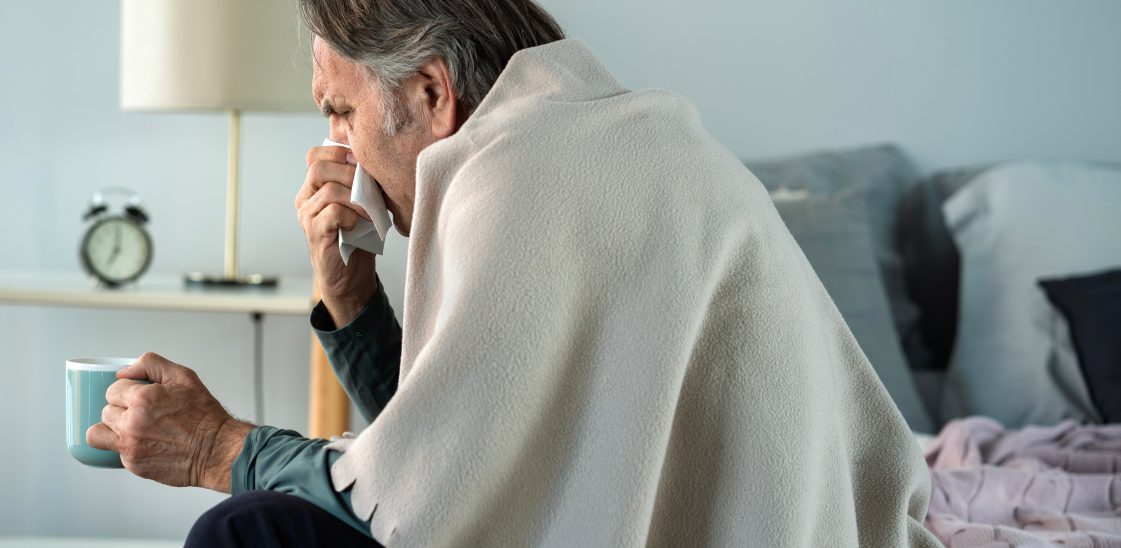
What happens to your immune system as you age?
Do you feel like you pick up colds and other infections more frequently than you used to? Does it take longer for you to recover from being ill now than when you were younger? Well, there may be a reason behind this.
In this blog post, we explore what happens to your immune system – your body’s defence system against infections – as you get older, and discuss the tell-tale signs of a weak immune system. We also take a look at what it means to have an autoimmune disease.
Does your immune system weaken?
Yes, unfortunately, it’s been well-established that the immune system declines as we get older[1]. In fact, there is even a medical term to describe this phenomenon: immunosenescence. This refers to the gradual deterioration of the body’s defence system as a result of natural ageing.
There are several reasons why the immune system weakens as we grow older. Firstly, the body produces fewer B and T cells. These cells, known as lymphocytes, are a major player in your immune response and they help your body to fight disease and infection. Secondly, these cells tend not to work as well as we age.
The result is that older adults are more likely to get ill because they have lower immune cell levels to fight off disease-causing germs like viruses, bacteria and parasites, and the cells that they do have do not function as well as they should[1].
Elderly people also tend to have a diminished response to vaccines[2]. Vaccinations trigger your body to produce antibodies against disease-causing organisms[3]. However, older adults produce fewer antibodies in response to vaccines, leaving them more susceptible to illnesses. Studies have also shown that older people have reduced vaccination longevity, meaning their immunity from diseases does not last as long.
Older adults also tend to have longer recovery periods than younger people following illnesses, infections and injuries. This is because the body makes fewer white blood cells which help with healing.
What are signs of a weak immune system?
The signs of a weak immune system include[2]:
- Frequent and recurrent infections, such as ear infections, pneumonia, meningitis, skin infections, bronchitis and throat infections
- Slow recovery from illnesses, injuries and infections
- Digestive problems, such as cramping, diarrhoea and loss of appetite
- Inflammation or infection of the internal organs
- Blood disorders; for example, anaemia
Of course, you may not have all of these symptoms if your immune system is weak but it’s important to be aware of the potential signs.
Fortunately, treatments exist for many of the illnesses you may encounter as you age. For example, you may be prescribed antibiotics to help you fight a skin infection or you may take sore throat treatments such as Chloralieve’s Honey & Lemon Throat Lozenges to relieve your throat discomfort.
However, it’s important to seek advice from a doctor if you think that your immune system is weakened as they will be able to offer advice on boosting your defences. For example, they may be able to support you with changing your diet, becoming more physically active, quitting smoking, getting more sleep and reducing your alcohol intake – all steps that can enhance your immunity.
What is it called when your immune system attacks itself?
Autoimmune diseases occur when the body’s natural immune system can’t distinguish between pathogens (disease-causing organisms) and the body’s own cells. This results in the body attacking normal healthy cells. While autoimmune diseases are especially common in young women, it is possible for autoimmune diseases to only be detected in midlife (between the ages of 40 and 60)[4].
Common autoimmune diseases include:
- Graves’ disease
- Hashimoto’s thyroiditis
- Lupus
- Rheumatoid arthritis
- Psoriatic arthritis
- Psoriasis
- Type 1 diabetes
- Multiple sclerosis
It is vitally important that you seek medical advice if you suspect that you may have an autoimmune disease, whether or not you are in old age.
Resources:
[1] https://www.ncbi.nlm.nih.gov/pmc/articles/PMC3582124/ Montecino-Rodriguez, Encarnacion et al. “Causes, consequences, and reversal of immune system aging.” The Journal of clinical investigation vol. 123,3 (2013): 958-65. doi:10.1172/JCI64096
[2] https://www.ncbi.nlm.nih.gov/pmc/articles/PMC3901832/ Lord, Janet M. “The effect of ageing of the immune system on vaccination responses.” Human vaccines & immunotherapeutics vol. 9,6 (2013): 1364-7. doi:10.4161/hv.24696
[4] https://www.immunology.theclinics.com/article/S0889-8561(02)00074-7/pdf
